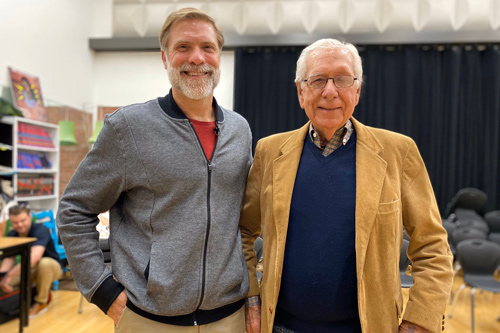UCI Neuroscientist James McGaugh and Acting Coach David Ihrig Share Acting Secrets at Local High School
Acting students at Corona Del Mar High School were in for an unusual surprise when a renowned neuroscientist came to class to help them with their monologues.
However, this was no ordinary neuroscientist. Dr. James McGaugh, founding director of the Center for the Neurobiology of Learning and Memory and professor emerita at UC Irvine, has a deep passion for acting.
Dr. McGaugh let the students in on a secret; when he first went to college, he was enrolled as a drama major. He took a psychology course hoping to learn memory techniques for acting, but instead he found his calling in studying the neurobiology of learning and memory.
Sixty years later he is now combining his incredible knowledge in the field of learning and memory and collaborating with David Ihrig, actor, educator and coach, on training young actors to use the power of their brain to create better, more engaging characters.

In their talk titled, “Four Memories Every Character Needs,” Ihrig and McGaugh guided students through a new approach to acting which David Ihrig describes in his upcoming book, “The Actor’s Algorithm.”
Ihrig says, “Acting is embodying behavior, and memory plays a significant role in determining behavior.” He went on to explain that to create a believable and engaging character, the actor needs to create relevant memories for the character.
So, how does an actor embody a character’s unique behaviors? Ihrig says it’s all about the Driving Belief. “After hours of conversation with Dr. McGaugh, we have come to the conclusion that the Driving Belief, or what motivates a character, is developed by our past experiences,” Ihrig said, “To find the Driving Belief you have to ask yourself ‘What happened to my character to make them believe an idea.’”
Ihrig instructed the twenty acting students gathered in the classroom to identify the theme of the story they would be acting. Then each student identified their character’s belief in relation to the story’s theme.
“This is when the fun begins,” Ihrig explained. “Now I want you to imagine the situation that gave your character this belief. That is the Driving Memory.”
Dr. McGaugh explained further, “There are four different forms of memory; recent memory, long-term memory, factual memory, and episodic memory. What is incredible about our brain is that we can use our imagination to actually create these types of memories for a character.”
Dr. McGaugh explained further, “There are four different forms of memory; recent memory, long-term memory, factual memory, and episodic memory. What is incredible about our brain is that we can use our imagination to actually create these types of memories for a character.”
Ihrig had the students close their eyes and instructed them through the process of devising the four memories every character needs, which consist of; the Driving Memory, a memory for the environment, a memory for the relationship, and a memory for the emotional state of the character. He asked students to imagine the sounds, smells, emotions, people, and locations that make up each memory. He then invited the students to use their imaginations to interact in the Driving Memory; touch the walls, talk to a person, and smell the air.
After creating these memories, one student remarked, “It definitely gives you more perspective and insight into your character and I feel like that definitely helps throughout the entire thing [creation process].” Another student observed, “I feel after this [memory exercise] I am a lot more in touch with my character than when we started.”
Dr. McGaugh also revealed that the brain’s natural affinity for novelty can be used to help ensure actor’s performances stay fresh and spontaneous. “One of the tools an actor needs to use, especially during a long-running play, is to create the memory or experience of novelty,” Dr. McGaugh told the students. “Next time you perform, put your character in the same situation, but pay attention to little things that change and how they affect you.”
Lastly, each student had the opportunity to explore their newly discovered characters by performing their monologues for the class while receiving feedback from Ihrig and Dr. McGaugh.
This collaboration between a neuroscientist and an actor was made possible by the UCI Brain Initiative’s Artistic Brain Theme. UCI Brain is an academic initiative that fosters interdisciplinary interactions about our understanding of the brain. The Artistic Brain Theme is one of the Initiative’s four cross-cutting themes to promote cross-disciplinary research. To find out more, subscribe to the UCI Brain e-newsletter.
